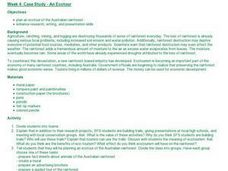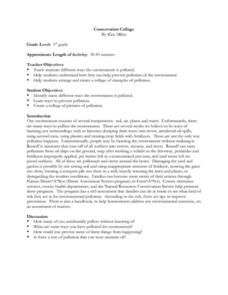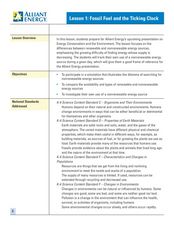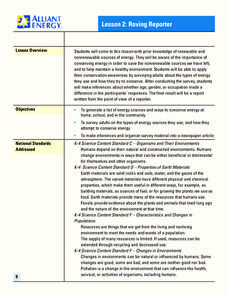Curated OER
You Are What You Drink!
Young scholars explore water treatment systems. In this water conservation ecology lesson, students identify and explain several processes used for water treatment and define related vocabulary after listening to content information...
Curated OER
Case Study - An Ecotour
Students plan an ecotour of the Australian rainforest. They prepare fact sheets about animals, create a mural, prepare a advertising brochure and a guided tour of the rainforest.
Curated OER
What Is Sustainability?
Students discuss environmental preservation and sustainability and their role in consumption and preservation. After a brief demonstration of how limited our resources are, students determine which natural resources they use most...
Marine Institute
Water Pollution
Sixth graders investigate the various types of pollutants found in water and ways to help prevent water pollution. Through a hands-on experiment, students create samples of polluted water by mixing water with vegetable oil, dirt,...
American Museum of Natural History
What's the Big Deal About Water?
It may seem simple, but water is one of the most unique substances on Earth. An interactive online lesson describes its properties and importance in so many different situations. Learners interact with the lesson to learn the role water...
Curated OER
Looking At Water: a Walking Field Trip
Fourth graders observe the effects of water on the soil and record those effect by drawing sketches of water erosion and conservation practices.
Curated OER
Where Does the Water Go?/Part 1: Permeability
Students determine how water holding capacity influences plant growth by observing different types of soils and their ability to hold water. They record their results on a soil permeability worksheet.
Curated OER
The Dirt on Worms!
Fourth graders make predictions, observe, collect and record data. They investigate several soil and worm websites. Finally, 4th graders write a letter to The President which defends earthworms by explaining their value to the United...
Curated OER
Conservation Collage
Students identify many different ways the environment is polluted, and determine ways to prevent pollution. They create a collage of pictures describing how the earth becomes polluted.
Serendip
Where Does a Plant's Mass Come From?
Where does the mass for a growing tree come from? Scholars consider a few different hypotheses and guess which is correct. They then analyze data from different experiments to understand which concepts science supports.
CK-12 Foundation
CK-12 Earth Science Concepts for Middle School
Explore a variety of science concepts in an interactive textbook created for middle school scholars. A lengthy table of contents takes readers to pages comprised of a subject overview, outline, and summary. Follow links further to find...
Curated OER
Field Trip Preparation
Young scholars make a contingency plan in case of unexpected events such as bad weather. They discuss safety and appropriate conduct.They map out a schedule to ensure that sufficient time is allotted for all activities.
Curated OER
Grow Your Own
Students study the growth and care of plants. They take tour of their school site and plant seeds to observe their growth. Afterward, they answer questions about the origin and value of their plants.
Curated OER
Fossil Fuel and the Ticking Clock
Learners study energy sources to learn about fossil fuels and environmental concerns. In this energy sources lesson, students watch demonstrations for various energy examples. Learners find hidden pennies, make a bar graph on their data,...
Curated OER
Earth: the Apple of Our Eye
Young scholars dissect an apple to model the percentage of land on Earth that can be used as a food-producing resource. They use fractions to determine the habitable and agriculture area of the apple.
Curated OER
Where to shop?
Young scholars study a topic of an environmental nature that is relevant to them (as individuals) on a local level, but with global implications. They consider whether their family's shopping habits have any lasting effects on the...
Curated OER
Soil, Forest, and Land Conservation
Students discuss the demands on the rainforest and devise a management plan that satisfies competing uses. They then construct a diorama to show the location of the various sites.
Curated OER
LOSING GROUND
Students will observe wind erosion and how crop residue prevents erosion.Point out the three kinds of fields to the students. Do as much or as little instruction as needed to explain the pan with crop residue. Conservation tillage...
Curated OER
Erosion
Fifth graders study what erosion is, what causes it, and ways to slow its progress. They complete an experiment that depicts soil moving down a slope as water is poured on it to show how moving water erodes land. Next, they observe...
Curated OER
Erosion
Students discover the meaning of the word erosion and discuss effects of rocks and sticks upon the soil. They then work in small groups to construct a model of erosion to make observations and then write them in their science journals.
Curated OER
Renewable vs. Non-Renewable Resources
Fifth graders identify renewable vs. non-renewable resources and comprehend why conservation of resources is important. They are asked what they think the words natural and resource mean. Pupils then put the words together to define...
Curated OER
Roving Reporter
Students write a report about energy use. In this conservation lesson plan, students interview adults about their use of renewable and nonrenewable energy. Students synthesize this information and write a report from the point of view of...
Curated OER
The Water Cycle
Students develop a better understanding of the need to conserve our renewable resources. In this water cycle lesson students take notes, complete a guide sheet and illustrate the water cycle.
Curated OER
Reduce, Reuse, Recycle
Fourth graders discover the differences between: reduce, reuse, and recycle by performing hands on examinations. They list what would happen to the soil if we allowed the earth to wash away and briefly discuss the meaning of erosion.

























